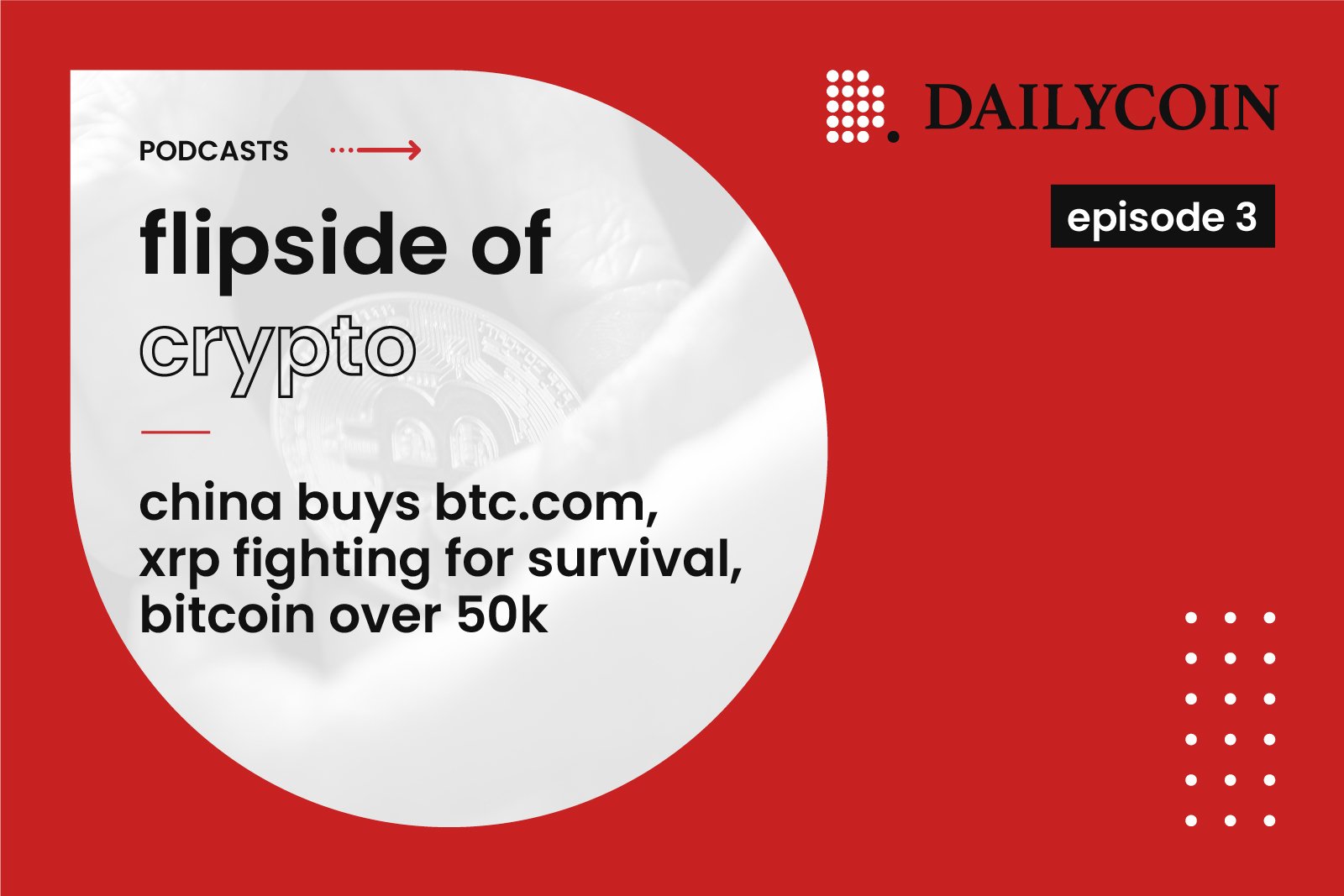
Welcome to “The flipside of crypto” podcast. We have three relevant topics to cover in today’s episode, and they are: China renews interest in crypto; MicroStrategy doubles down on bitcoin; and the turns in Ripple’s lawsuit.
What is going on, why and what does it mean? DailyCoin brings all the important facts to light. And then flips them to see both sides of the topic. The broader the context, the better. So, let’s begin.
China renews interest in Bitcoin
This week South Korean crypto exchange DBX got a working permit to open in China. The platform is the first cryptocurrency trading platform recognized by Chinese officials. Its branch called Tabi will start operating in March.
The South Korean DBX called this a big move as China’s stance towards digital currencies has been harsh for some time. The communist government had banned cryptocurrency exchanges and initial coin offerings back in 2017.
China does not recognize digital currencies as a legal tender or a tool for retail payments. The country represents one of the biggest crypto markets, but its local banking system does not accept any existing cryptocurrencies or provide relevant services.
Despite the fact, Chinese sports lottery company 500.com bought cryptocurrency mining pool BTC.com from Bitmain Group on Tuesday. BTC.com is a multi-currency mining pool that mines various currencies including bitcoin, bitcoin cash, ethereum and litecoin.
Sponsored
Does it mean China is liberalizing its approach to digital currencies? Could this be positive news for the market? Well, let’s take a look at the flipside.
Despite its strict policies on crypto, China suffers constant capital outflows. Local people are moving their funds to cryptos, as the country’s currency – yuan- is losing its value.
China is already a bitcoin mining leader, it generates 65% of the bitcoin network’s total power. Massive cryptocurrency mining plants are based in the Sichuan province to take advantage of extremely cheap electricity prices there.
The country is developing its own Central Bank Digital Coin, in other words – a digital yuan. Local cities are planning to test it this year. There are speculations that the push for a faster adoption is a move to curb the growing outflow of bitcoin.
Despite its hostility for cryptocurrencies, China has a completely different stance towards the blockchain. The country develops its national blockchain network (BSN) which will integrate smaller networks into one big one. The big one will be controlled by the government. Who could deny China is clenching its fists on bitcoin miners as well?
MicroStrategy doubles down on bitcoin
Bitcoin hit a new milestone on Tuesday. The world’s leading crypto surpassed the $50,000 level for the first time in history and set a new all-time high of $52,547 the day after.
bitcoin’s price jumped right after the news from MicroStrategy. The US-based software intelligence firm revealed its plan to sell $600 million worth in convertible debts to buy bitcoins. Microstrategy is one of the biggest crypto investors and poured hundreds of millions into bitcoin last year.
The company held 72,000 bitcoins under its possession at the start of February. That is more than $3,7 billion dollars worth at bitcoin’s all-time high price.
MicroStrategy is not the only big player with hundreds of millions invested in bitcoin. More corporations have followed it, with Tesla being the latest. The Electric car giant spent $1.5 billion dollars to buy bitcoin last week. The biggest digital asset manager Grayscale operates almost $32 billion in assets in its Bitcoin Trust.
Bitcoin futures on Chicago Mercantile Exchange are set to reach a $54,127 high in June this year. Such an enthusiastic adoption raised questions of how soon bitcoin will be all bought up by the large investors? And does it mean smaller players will be out of the game?
Not so fast, maybe. On the flipside, we have governments that have wide regulatory powers. They might not go hand in hand with the corporate needs. A respected investment advisor Dan Nathan warned earlier this week that the United States government will not allow corporations to replace dollars with bitcoins.
The United States dollar is the primary reserve currency for the global economy and one of the most widely used currencies in international trades. It’s difficult to imagine that the United States will willingly give up their global influence.
The investment advisor categorically stated that short-term benefits would be nothing compared to the slump that could happen to bitcoin if government regulations appear.
An impressive bitcoin bull rally since last October has raised warnings of forming a bubble. Several surveys conducted this year by the German Bank and Bank of America showed worries of imminent correction that extremely bullish markets might face.
Bitcoin has settled its narrative as a store of value, but it is still highly volatile. The argument is strong enough for part of corporate CEOs not to go all-in into digital currencies.
What’s new on Ripple’s lawsuit?
The US Securities and Exchange Commission and Ripple Labs announced the joint letter on Monday. The letter addressed to a Federal Judge stated there could be a chance of settlement before the expected trial.
SEC filed a civil lawsuit against Ripple Labs and two of its executives last December. The regulator alleges the company had been selling XRP coins as unregistered security since 2013. Ripple Labs ran coin offerings for years and sold $1.3 billion worth of XRP coins without registering with the regulators.
If XRP cryptocurrency is acknowledged as a security, it means it is a tradable investment contract used to raise funds for a business or organization. In such cases, the registration requires to provide potential investors, especially the smaller ones, with important information about an issuer’s business operations and financial condition. The regulator accused Ripple Labs of sharing only partial information with the investors.
XRP price lost half of its value immediately after the SEC announcement. The major cryptocurrency exchanges including Coinbase and Binance suspended XRP trading and delisted it from their platforms. The Largest digital asset manager Grayscale started a dissolution process of its XRP Trust.
Ripple Labs rejected the charges, stating that XRP is a currency and does not need to be registered. The company even filed a request based on a Freedom of Information Act, asking the SEC to provide documented proof on how they determined that bitcoin and ethereum are not securities. The XRP price jumped back by more than 110% since Ripple Lab’s response at the end of January.
On the flipside, Ripple Labs’ future still hinges on a judge’s ruling. The pre-trial conference of the case is expected to happen next week. Now, with the joint letter from both the SEC and Ripple Labs, it seems that the parties agreed to speed up the proceedings.
Ripple Labs and SEC might reach a settlement in the long run, but the psychological impact to new potential crypto investors could be diminished. The case has already been called the crypto lawsuit of the century, and also has a potential to create precedent for how authorities place regulations on digital currencies.
Anyway, it will be very interesting for all of us to see how this case will continue. If Ripple Labs agrees to the settlement, does it mean that they recognize their guilt? Does it mean Ripple Labs agrees to pay fines? Thank you for listening and see you on the next episode of “The flipside of crypto”.
